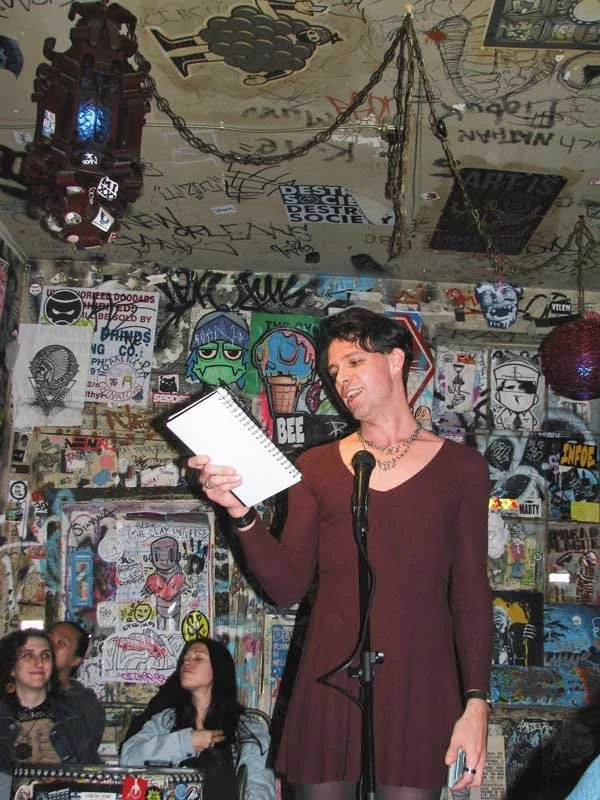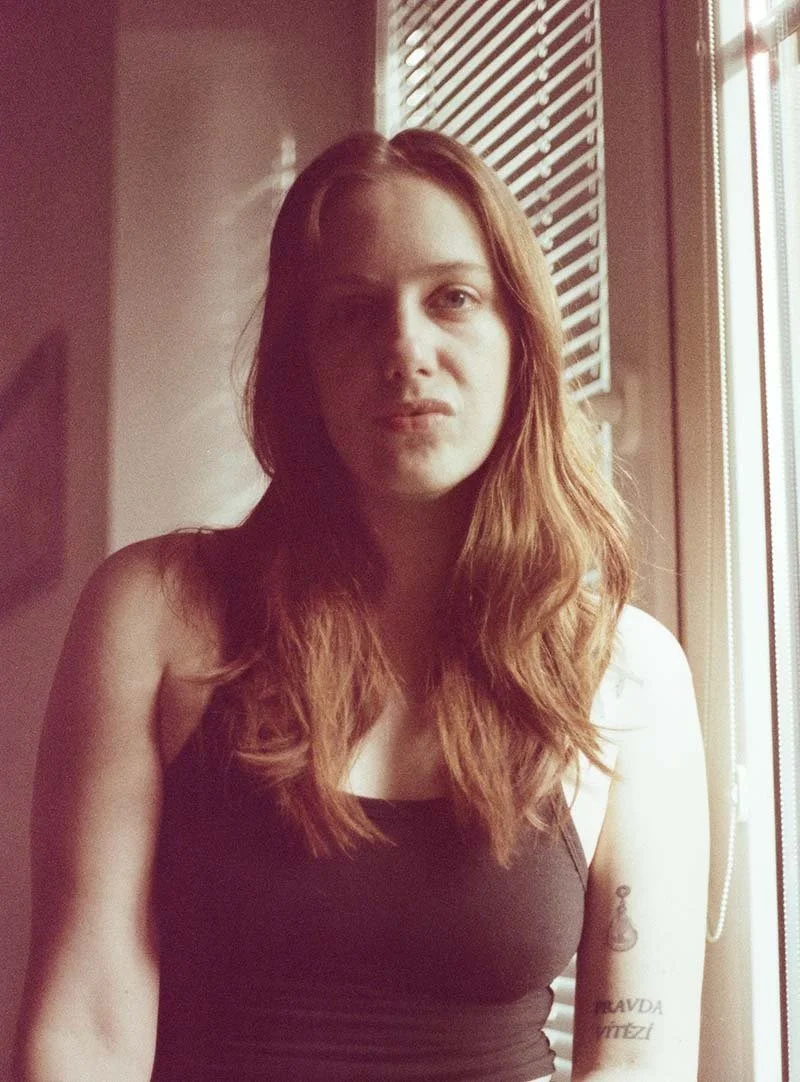Noah David Roberts is a non-binary poet based in Philadelphia, PA. NDR is the author of several collections, including Mutable Forests (Kith Books, 2023), GUNK (Querencia Press, 2024), & SWARM (Kith Books, 2024). Since publication of their first book, Roberts has been published in Tinderbox Poetry Journal, fifth wheel press, more. In 2022, Roberts won the Judith Stark poetry contest. They are a 2023 Pushcart nominee & have been nominated for the Elgin Award in Speculative Poetry. Roberts is an organizer of the World’s End Writing Retreat, & was an editor for Graphic Violence Lit. @the.apocalypse.poet
You grew up in Northern New York—how does that environment still echo in your writing today? That place is cold, harsh, empty, post-industrial. Lots of old, empty factories. The part of New York State I'm from is not known for being welcoming of queer people. I came out around the age of 24. I think often of that town, the repression, the outright hostility for those who are under the LGBTQIA+ umbrella. I think growing up somewhere that felt so abandoned & isolated pushed me & my writing in the opposite direction -- towards maximalism, towards complex syntax & weird diction choices. I look for more, more, more. Isolation breeds desire for more. Lack breeds desire for more. If queerness is the process of building oneself over time, & discovering, my poetry echoes that through it's connection to place (sometimes).
What were your early reading habits like, and do any childhood books still linger in your imagination? I was a desperate, hungry reader. I read a lot of fiction, when I was younger. I loved the classics, funny enough, for someone so interested in experimental writing. I remember diving into The Odyssey & The Iliad at the age of eleven, which fed into my love for words, expression, & led me into older, more traditional forms of poetry, where one often starts -- the romantics, mainly. This was instrumental in my understanding of rhythm & chime in poetic works; Keats, Shelley, Blake, all masters of the music found in poems. But my first poetic love was Shel Silverstein, at a very young age, exposed to his poetry through A Light in the Attic & Where the Sidewalk Ends. This must have been my very early childhood days.
Describe your typical writing day. A typical writing day doesn't really exist for me. I don't know if creative processes can be typical. I write very frequently, sometimes multiple times a day if I can. But usually it consists of waking, pouring myself a coffee, sitting at the keyboard & throwing out words until I have some block of marble to chip away at. I love writing in the morning, but it can control your day if you're not careful. It's sort of a haphazard, furious, fast typing, & as Charles Olsen says, summarized, everything in a poem must always, constantly, with heavy urgency be moving into the next, everything must be active in order to translate thought into expression. I'll usually work on this for about an hour in the morning, & then go about my day, go to work, & forget about the poem for a short while, return to it later in the day, do some edits to turn the gears & start writing something else. During this whole time away from the keyboard, or typewriter, or notebook, whichever weapon in my arsenal I'd brandished that day I'll read the poem obsessively to catch the rhythm & sonics. My mentor always said write for the ear, & I agree.
Can you share how SWARM and GUNK evolved from idea to finished books? SWARM was written at the same time as GUNK, which is before I went on & came off of HRT due to interactions with my other medication. Often, I say if GUNK is a curse, SWARM is a reclamation. I'd have gladly stayed on Estrogen, & was deeply impacted when I tapered off. I lost my health insurance & it wasn't feasible for me to continue, & alongside this there were intense interactions with my other meds. The book was finished by the time I came off Estrogen. I wrote the book pre-HRT & edited on HRT in an attempt to directly channel the full spectrum gender experience I was going through as a transitioning non-binary individual. This is a large part of my identity. These experiences are the culmination of a life of confusion & repression, & shall not be taken away from me or invalidated, even with the further radicalization of queer oppression in the US. But, SWARM is as much about wasps & my memory of stepping on a wasp nest as a child as they are my gender experience; my queerness a swarm of hornets, bursting forth. It could not be held tightly in any longer. At the same time, the poem from my previous book GUNK, titled "Digging (after Kim Hyesoon)" was nominated for a pushcart prize. This poem has become a "fan favorite" at readings. One time, someone from the crowd shouted from the back of the room that they wanted me to perform the "hole poem." I wrote that poem in five minutes on my close friend (& wonderful poet) Lindsay Hargrave's in-laws' couch during a small poetry tour we set up around the tri-state area after their car broke down between gigs two years ago.
Do you keep any kind of daily writing or idea journal? I do keep a journal, but I'm not a consistent journal-er. I'm more of a consistent poet. I write poems more than I write journal entries, so the notebook is mainly filled with to-do lists, feverishly jotted opening lines to poems, because I never hand-write poetry, I always type, it's better for the momentum of my writing process. I organize & produce a lot of literary events as well, so the notebook is full of event ideas & plans.
How do you research and what role does research play in your writing? I see research for poetry & research for world-building / academic writing / historical writing / etc. as very different. One obvious answer to this question is reading. I read a lot. For poetry, another answer I could give is that my research comes from interacting with the world. Everything funnels into the channel of the poem as it enters the page from the writer's hands, so I must be always attentive, always experiencing. Living widely is artistic research. I don't like poems that make sense, so accuracy isn't always my goal. Evoking an emotion or image is much more important to me. I try not to drown my readers in extra information. In Mutable Forests, the motif of the tree is repeated through the use of latin names, scientific names. I did a lot of research into the different symbols that come with those trees on the internet, but I also created my own mythos for them.
If you could spend an evening talking with any writer, who would you choose and why? It's tough to just pick one, but I'd love to have dinner with Kim Hyesoon, a poet I've been reading for a couple years now. Her work is wild. I'd love to chat about it. But, I'd also love to do a pickleback shot with Henry Miller.
Do you draw inspiration from music, art, or other disciplines? Of course. I'm mostly inspired by film. I think a good film can be or contain moments of a poem, in the same way that a poem contains images that are filmable in the mind's eye. I'm especially inspired by horror films, foreign films, the French New Wave. One of my favorite films that is also a poem is Ingmar Bergman's Persona, equally personal & omniscient. I also love Stagefright, a giallo film from the '80s. I'm very influenced by music as well, of course, all sorts. Inspiration can be found anywhere.
How has your view of writing changed with the rise of AI? What’s your response to the idea that AI could “write” literature in the future? I don't think AI has any place in the creative process point blank. AI is a tool predicated on stealing work from people who have poured themselves into something. AI also doesn't have any firsthand experience, & I don't think it would ever make me feel something the way work made by a person does. The poetry & art created by AI can only evoke what a feeling might be. It will never know the humanness of creating art, the decisiveness. It will never know the tenderness or honesty necessary to write a poem. I don't want to read a poem written with any use of AI, & am firmly against the use of the tool in the creative arts. Besides the ethical ramifications, the plagiarism, the environmental effects, I see no value to AI as a tool for creating art as it is predicated on stealing work from elsewhere. Human art is invaluable, a form of reporting, a form of archeology & revelation, a form of expression & dialogue. AI seeks to remove us from that process.
Tell us about some books you've recently enjoyed and your favorite books and writers of all time. Some collections of poetry that have been important to me: All the Garbage of the World Unite by Kim Hyesoon; We Want It All, an Anthology of Radical Transpoetics; frank: sonnets by Diane Seuss; The Dead Emcee Scrolls by Saul Williams; Philomath by Devon Walker Figuero; Revolutionary Letters & Loba by Diane DiPrima; Girlgirl by Kim Koga; Girl 2.0 by Nora Hikari. These are all collections of poetry that have been occupying the forefront of my mind. I talk about Girlgirl all the time. This collection is fundamental in understanding my love for the chime & play of language; the portmanteaus; the syntax; the spacing; the shapes; the diction. I don't read fiction very fast. But, right now I'm reading The Brothers Karamazov, & have fallen in love with the works of authors like Clarice Lispector (my current top pick) & Juliet Escoria. On a general basis, you'll catch me reading maybe one or two novels at a time, really taking my time with them, & multiple collections of poetry.
How do you personally connect to arts and culture, and what significance does the creative process hold for you? I didn't ask to be a part of the culture war, wrote Margaret Killjoy. But it's here. In the modern political landscape, I think art is the most powerful mechanism. How else to explore living? How else to conceptualize alternatives to the systems that oppress so many? How else to experience other perspectives, some that might possibly be diametric to those of the viewer / reader? I believe, as corny as it sounds, that good art changes minds. Good art evokes a feeling, a relation, a recoil. Poetry, I think, is extremely important right now. I believe fully that the syntax of our day-to-day language perpetuates these systems of oppression. We must break through. Thoughts burst at the seams of our communication tools. It is impossible to relate a true, full queer experience through a poem without breaking some rules to burst from that box a hopeful individual self-created; impossible to relate a queer story with heteronormative language & language structures. I think about this a lot. In a world overcome with fascism, to express queerness through art is to create one's own singular way of expression. This is a revolutionary act. Queerness is hyperpersonal. Poetry is hyperpersonal, as is all writing. It's vulnerable & cannot be taken away from us.
















































































